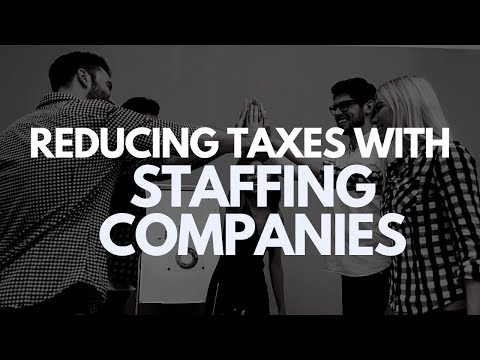How to Create Staffing Companies to Save Tax
December 11, 2023
Dateline: Kuala Lumpur, Malaysia
The easiest kind of business to move offshore is the kind of business that can fit in a backpack – the kind of business that lives in the cloud. This is the kind of work that you can do remotely, totally location-independent. All of your work and effort is sitting on a server somewhere waiting for you wherever you are.
We talk a lot about these kinds of businesses because they fit smoothly into the Nomad Capitalist lifestyle of going where you’re treated best.
But, what if your business isn’t so easy to just take offshore? What if you’ve got people physically on the ground answering emails and going out to get jobs done? How do you offshore that?
In a case like this, offshoring your business isn’t a straightforward process. There are many people who make mistakes by acting too aggressively with their offshore strategy. Others are too conservative and lose important opportunities. People on both sides of the coin are running into problems that keep them from reducing their tax burden.
So, how do you get all the tax benefits of offshoring your work without ruining your ability to do business?
Depending on your situation, there could be a couple of different answers to this question. One of them is that you restructure your business and create staffing companies to compartmentalize your taxes.
In this article, we’re going to cover what exactly a staffing company is, the problems both conservative and aggressive strategies run into by going offshore, and how staffing companies can help you grow your business and go where you’re treated best.
But, before we get too deep, you should know that this is a very complicated subject. I don’t say that because I’m worried that you won’t be able to keep up. I say it because I need you to understand that I’m not giving you tax advice right now. I’m going to make this article as basic as possible, but the kind of stuff we’re talking about here requires in-depth study, memo writing, and all kinds of official tax work.
I work with accountants and tax lawyers all the time to put together the information they’ll need to make the principle we’re going to talk about work for people on a global level. Don’t take this as tax advice. Try to focus on understanding the underlying concept I’m getting at.
What is a Staffing Company?

A staffing company is a relatively simple thing. These companies provide temporary, contractual, or permanent labor as a means to fill holes in the services, logistics, or structure of another company.
Staffing companies are used to help companies be more flexible with seasonal business or transitions in management. If you use a staffing company to strengthen your workforce right before the busy season hits, you don’t have to worry about hiring and then laying off workers as business ebbs and flows. Everyone you would bring over would be on a temporary contract.
These staffing companies also relieve some of the headache of recruiting and managing employees. Workers supplied by these companies are not employees of the businesses they go and work with. Their contracts, social security, and employment are all managed by the staffing company.
Working with a staffing company means paying fees on top of labor wages, but there are a number of different situations in which paying that extra fee could be worth it.
Especially when you’re trying to take your business offshore.
One of the things that we talk about on our site for our nomadic readers is outsourcing and offshoring their labor. Instead of paying the rates you would at home to have someone manage your social media, why not find an educated professional through a place like UpWork to do it for you? If you do it right, you’ll pay less and save more money in payroll taxes.
Using a staffing company to reduce your tax burden can work relatively the same way. Except, instead of hiring freelancers, you’re creating staffing companies to help do the work of the companies that are actually making you money.
A Note on Staffing Companies and Transfer Prices
The big reason this works is because of transfer pricing.
A transfer price is the cost that related parties (like two departments of the same company) charge each other for goods and services. Transfer prices are usually very close to the regular market value of the product exchanged.
You can see transfer pricing used in many multi-entity corporations, like Google or Starbucks, that are often talked about in the media for their transfer pricing tax strategies. These large corporations use transfer pricing to help properly determine the profits of the individual companies they’re made up of instead of reporting as a whole.
Individual companies inside these corporations exchange goods and services at transfer cost in a structured supply chain that has been, at least in part, designed by accountants and tax lawyers.
These companies report their profits and pay taxes in the countries they’re based in, all to save each company and the multi-entity corporation as much as possible in taxes.
Now, with both transfer costs and staffing companies in mind, let’s use a couple of examples to explore these ideas:
Conservative Offshoring and Staffing Companies

Every country in the world wants to ensure they’re getting the tax money that is owed to them. Because of these efforts, we’re ingrained with the idea that we have to pay a high amount of tax. We grow accustomed to it. This mindset fogs people’s vision of the global picture.
There was a guy who came to me recently who was running a company that did work in over a dozen different countries. He had workers on the ground in these countries doing physical work. His office, however, was in the United States.
The trap that he and many others have fallen into was that all of the money went to the office in the US first. He reported the profits of the entire company and paid taxes there before sending out what was left to pay employees working in all these different countries.
His reality was that he was living overseas, marketing overseas, and selling overseas. All of the physical work that brought in the majority of the money was overseas. But the bulk of the profit was being taxed inside the United States.
He was making a very costly mistake because his company wasn’t structured properly.
You can see the same problem in Canada, Australia, or the UK. People will have all the money-making parts of the business offshore, but willingly pay taxes at a much higher rate when that money comes home.
This is where staffing companies come in.
Taking this US-based business as an example, you can create several separate companies. The offices in the US become a staffing company handling billing and other management work. Instead of bringing everything into the US, they charge a fee to the other companies around the world doing the physical work. The domestic company gets paid at arm’s length, allowing you to reduce your corporate taxes.
The result of this is that instead of paying taxes on 100% of a pot of profits back home, you keep a large percentage of those profits someplace where the work is actually being done. Someplace with a lower tax rate that’s more friendly to your business.
So, if you’re someone who’s living overseas and still running a business based back home in the US, Canada, Australia, or the UK, chances are you might be paying more than you need to when tax season comes around.
You could instead be setting up a series of companies that could reduce your tax burden all while ensuring that everyone is getting their proper piece – no one getting too much and no one getting too little.
But, this is where some of the complexity I mentioned above comes in. Transfer pricing studies need to be made to determine what someone would pay for a product to be manufactured or a service to be provided on the open market. Your company needs to be restructured from the flat corporate structure you have now so that you benefit from doing the right work in the right places.
Seeing the global picture will help you avoid paying way too much in taxes year after year so that money can instead be directed towards growing your business.
Aggressive Offshoring and Staffing Companies

Here’s the other side of the coin.
Let’s say you’re selling products on Amazon. Instead of taking the above conservative option and setting up your home office in the US, you’ve followed our advice and taken the company offshore to somewhere you’ll pay a lower tax rate and can sell the products at a lower cost to you than you would have back home.
In doing market research, you find out that when your customers call customer service, they want to hear an Australian voice.
The mistake that people make in this situation is that they decide that they need to hire a bunch of people in Australia to authorize refunds, take orders, and just generally do all their customer support work. The problem here is that there are certain rules surrounding employing people living in Australia.
And the consequence of that mistake is that those rules mean that you end up having to pay taxes in Australia as well.
The last thing you want is the ATO or IRS coming in and deciding that your entire business needs to be taxed all because you have your customer support based in Australia.
The solution here is to use a similar structure as we used above. Set up a staffing company in Australia, then go out into the marketplace with a tax professional and put together a transfer pricing study on what people are charging to answer the phone and provide the services you need.
Now, only the staffing company is taxed.
You take that regular market price and add an extra 20% on top of the payroll to your staffing company. That 20% of profit will get taxed in Australia instead of a much larger portion of your total profit, greatly reducing your tax burden. You’ve created a situation where everyone gets their appropriate piece and your business has more of its profit available.
Basically, all you’ve done is expand the supply chain and figure out an appropriate place for each part of your business.
Personal vs. Corporate Taxes Offshore
If you go through the process of working with professionals and experts on your specific situation, you might find that these ideas help you. But, just sorting out your corporate taxes shouldn’t be the end of the road.
Corporate taxes and personal taxes are two entirely different, but connected worlds. If either one of them is done wrong, it could sink any effort you make on the other. You need a working tax strategy for yourself just as much as you do for your business.
There are plenty of people who managed to make the leap into taking their personal life offshore. They’ve picked up a residency permit or maybe even a second citizenship in a country they enjoy. Maybe in a place like Georgia or somewhere in Latin America where they have a much lower tax rate on their income and are living the way they want.
But their company is still sitting in California with taxes eating away at their profits.
There are others who have a corporation in Hong Kong. They’ve successfully navigated the world of offshore incorporation. They’re running a successful business that’s growing by leaps and bounds, but they aren’t enjoying those leaps because they’re living in Adelaide.
They can’t enjoy as much of the lifestyle that they would like to have because of the high tax rates at home.
If you can get both personal and corporate tax strategies working harmoniously, you can more effectively use staffing companies to build out corporate structures that interact with each other at arm’s length – structures that ensure that everyone is getting paid just enough.
Reducing Your Personal Taxes

If you aren’t a regular reader of our blog, the idea of offshoring your personal life to reduce your taxes may be a little foreign to you. For example, when people think about a place like Kuala Lumpur, they’re usually thinking about a place to go on vacation.
When we talk about Kuala Lumpur, we’re talking about a place to live for a good part of the year and get a residence permit. We’re talking about the most livable city in Southeast Asia for expats and digital nomads.
Taking your personal life offshore and stepping into the life of global citizenship can open your mind to new cultures, people, and food. If done right, becoming a global citizen can also put you in a better financial situation by reducing your tax burden and cost of living.
All without sacrificing the quality of life you’ve come to enjoy.
Looking through some of the articles on our site can teach you how and where to open an offshore bank account, help you find a country where you can get a residency permit that suits your needs, and show you some of the common pitfalls and traps that uninformed nomads fall into.
Over a decade of personal experience, failure, learning, and success has gone into the ideas and concepts that we share here. For example, take a look at my Trifecta method to see how you can better establish your personal tax strategy and enjoy more of the world the way you want to.
Remember, if you really want to reduce your tax burden, grow your wealth, and go where you’re treated best, you have to have personal and corporate tax plans that work together. One without the other just holds you back.
Conclusion
Staffing companies can be a great part of your offshore tax strategy if they work in your situation.
If your business is just you, a laptop, and a server with all your information somewhere, you won’t benefit as much. Creating a staffing company to handle the work of a few Filipino virtual assistants or a group of independent contractors isn’t going to bring the same tax reduction.
But, if you’re a high-net-worth individual with an international business that employs people in a variety of different roles, creating a staffing company could very well be your next step. You can compartmentalize your business into different companies and control the flow of profit in the same way you would your supply chain.
It will, of course, be a complicated step, but one that many other people have already taken.
What’s most important is that you use the concepts here to develop a plan of action that you can use to push your business forward. A solid, legal strategy that will solve problems rather than an uninformed mess of mistakes that will lock you up tighter than you felt you were before.
Again, it’s always worth getting proper advice on this. Never rely on tax advice you get from a YouTube video or a blog article. Work with a professional team to ensure that your corporate structure reflects the people working for you in a variety of different places so that you’re not paying too much or too little.


Does Puerto Rico Pay Taxes to the US?
It’s a common question and one that often fuels confusion, debate, and a fair share of misinformation – Do residents of Puerto Rico actually pay US federal taxes? When most people think of US tax obligations, they naturally assume they apply uniformly across all US citizens. But when it comes to Puerto Rico, things are […]
Read more

Zug Canton Taxes: The Ultimate Destination for Wealth Management in Switzerland
Switzerland’s global reputation is built not just on stunning views of Alpine peaks and serene lakes but also on a foundation of exceptional quality of life, world-class infrastructure and investor-friendly tax policies. The results speak for themselves: efficient public transport seamlessly links cities and villages; the standard of living regularly ranks among the highest in […]
Read more

How Smart Investors Use Venture Capital to Build Wealth
Big companies like Google, Amazon, Facebook and Apple all started out as bold ideas backed by venture capital. Decades later, the same firms are household names, as familiar to most people as electricity, the internet, or the telephone. But hindsight is a fickle friend. The truth is, it wasn’t always so obvious they’d succeed. These […]
Read more





